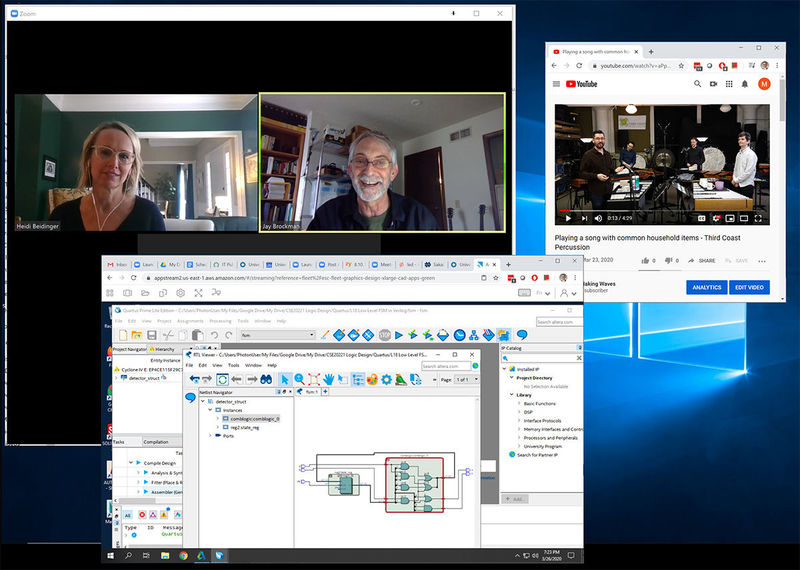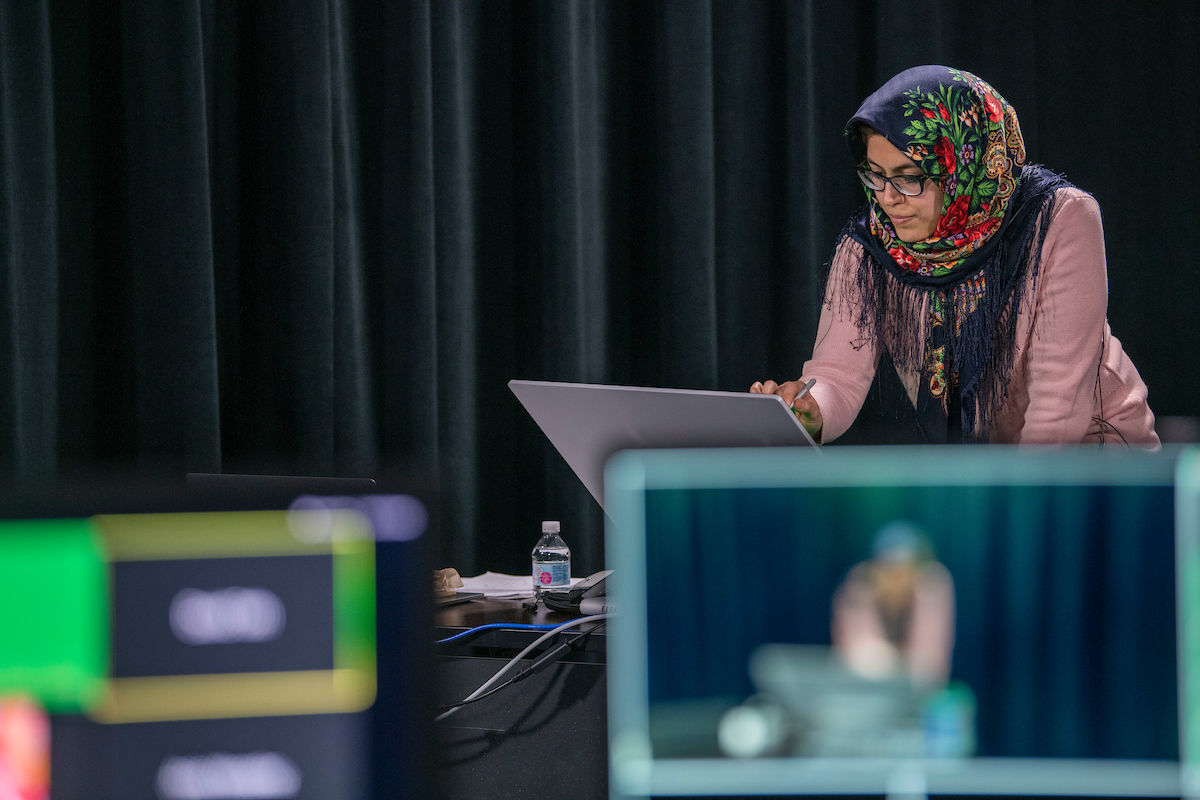 Jay Brockman meets via Zoom with Heidi Beidinger, president of the St. Joseph County Board of Health, while preparing course material for Digital Logic Design.
Jay Brockman meets via Zoom with Heidi Beidinger, president of the St. Joseph County Board of Health, while preparing course material for Digital Logic Design.
Jay Brockman planned for “business as usual, just remotely” when Notre Dame announced on March 11 that in-person classes would be suspended due to the COVID-19 pandemic. Even after the subsequent announcement that online learning would continue for the rest of the semester, Brockman saw little reason to stray from his usual approach.
An associate professor of computer science and engineering, Brockman likes to treat the sophomores in his Digital Logic Design course like professional engineers even though, he says with a chuckle, “on day one they barely know what a bit is.” By the end of the semester, his engineers-in-training were to produce a final project from options that included a “vintage, ’80s-style arcade game.” In other words, a “fairly sophisticated digital system” that requires teamwork.
His students contacted him with concerns about the group projects and grades. Brockman learned they would be studying from an Alaskan island, from Miami, and from 149 other places. How would they finish a hands-on group project normally completed in a Fitzpatrick Hall lab? He didn’t know. So he abandoned business as usual and made the project, normally a significant portion of a student's final grade, optional.
- Academics, Disrupted
- Change of Course
- Research in Hibernation
Grades aside, Brockman heard other pressing student concerns. Some have poor internet access. Others don’t have enough time to complete assignments because they have to look after younger siblings while their parents work. Others are struggling psychologically due to the isolation.
To address these issues, Brockman asked four students to set up a group system where they look after one another and let him know if anyone needs special attention, a check-in and “triage” approach he expanded to the entire class.
Tatiana Botero, an associate teaching professor of Spanish, also takes a communal approach. Conscious of the confusion and frustration that can arise from the sudden transition to online learning, Botero regularly asks her students about their mental health. And like Brockman, she also collaborated with her students to ease the adjustment. Through a series of Google Forms, she gathered student feedback to inform class proceedings.
Botero teaches three sections of Cultural Conversations and Writing in which she encourages students to “think, pair, share” their thoughts in Spanish. When students pair up to practice their speaking, Botero wanders the room to observe and plan for the class sharing phase. Now that her class is online, she replicated this approach with Zoom, a video conferencing platform recommended on Notre Dame’s Instructional Continuity site.
With Zoom, Botero’s students can chat among themselves while she drops into their chatrooms to observe. It’s not a perfect method, she admits. Students on the west coast, for example, have to sign in to Zoom earlier in their day to chat live with their eastern peers.

Botero’s other class, a community-based learning course called Immigration and Construction of Memory, had an easier transition. In this class, students worked in groups of four to interview immigrant families associated with South Bend’s bilingual child development center, El Campito. Interviews were to be transcribed and shaped into simple manuscripts by April 9 so that they could be printed, bound and given to the families by the end of the semester. Her class still plans to meet the original deadline, concluding their weekly interviews over the phone.
Still, online classes present challenges for Botero. She misses moving around a shared space and finds it “tiring to sit for so long.” She also worries that remote learning could weaken the sense of community among students that she strives to create in the classroom.
Maintaining community is a common priority among Notre Dame faculty, even among those not teaching this semester. Selena Anders, assistant professor of architecture, and Kristopher Muir, an assistant teaching professor of management and organization, did not have to prepare their own remote classes, but they offered to assist their colleagues.
Anders has experience with challenges that come with a sudden adjustment to teaching architecture online. Two years ago, she was hospitalized while teaching at the School of Architecture’s Rome program, so she administered her final exam over Skype. Her colleagues moved a computer around the architecture examination room so that she could observe and respond to each student’s presentation from her hospital bed.
Now on sabbatical in Chicago, Anders vows to return the favor. “This is an extraordinary time,” she says, “so if they need me, I can be available.” She offered to not only help organize online classes, but to also teach if necessary.
Despite not teaching himself this semester, Muir has been involved in preparing courses for the Department of Management and Organization in the Mendoza College of Business, working from home with his wife, Cindy, also a professor in the department.
“It’s been a very disruptive experience so far,” Kristopher Muir says. “We have not been to the office in multiple days. We have webcams set up. We’ve created a makeshift office where we’re going to record course materials. Many of us are without childcare.”
In between caring for his two young daughters, Muir has found time to support his colleagues. He attended meetings with an international management professor and a teaching assistant to offer advice and “empower the [professor’s] teaching assistant to really help co-host within a live teaching environment.”
Muir believes Notre Dame is “a community that helps each other, that comes together in an unprecedented time. I think students will see that this is not an easy experience for them. They will probably on some level empathize with the faculty that it’s not an easy experience for the faculty. But we can not only get through this, we can grow through this experience together.”
Victoria Erdel is the social media marketing manager at Starfish Project.